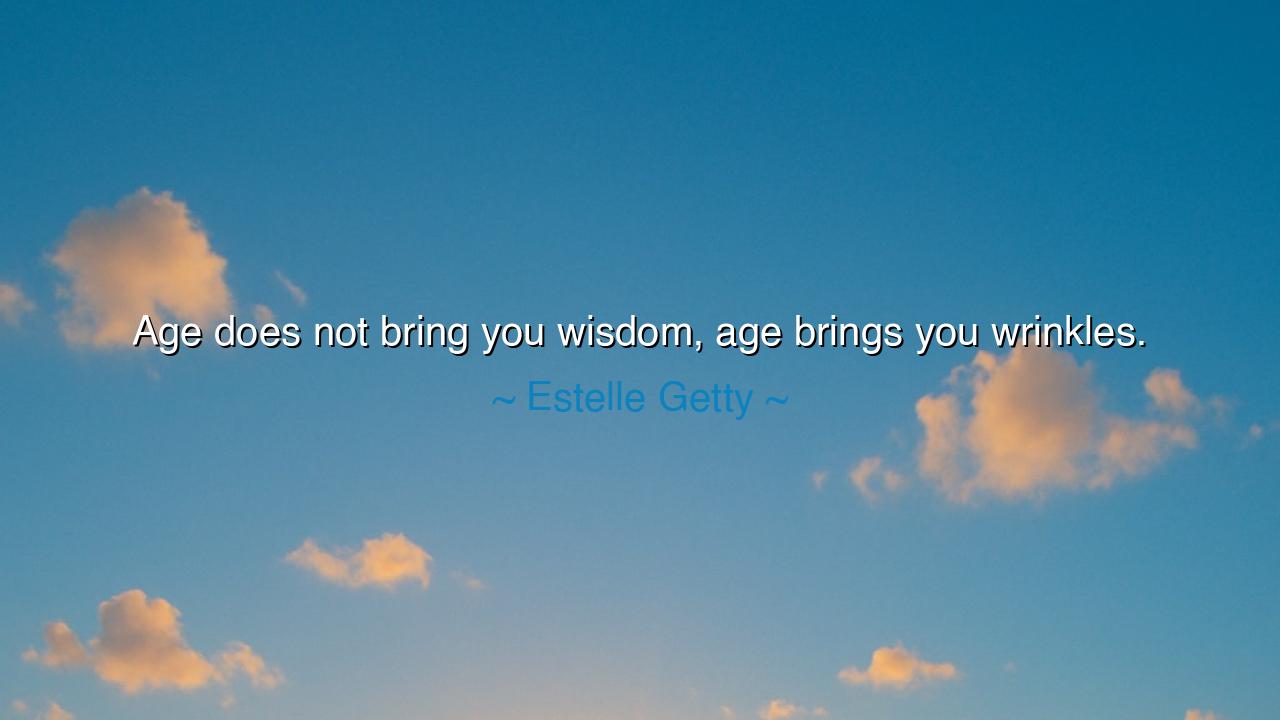
Age does not bring you wisdom, age brings you wrinkles.






“Age does not bring you wisdom, age brings you wrinkles.” These words of Estelle Getty strike at the heart of a timeless truth — that wisdom is not a byproduct of the mere passage of time, but a result of experience, reflection, and a deep engagement with life. Age may bestow upon the body the marks of time, the wrinkles and frailties that come with living, but it is not the years themselves that give us the true understanding of life’s mysteries. Wisdom comes from how we live those years, how we choose to face the trials and joys, the successes and failures, that make up the tapestry of our existence.
In the ancient world, the revered figures of philosophy did not claim wisdom simply because they grew older, but because they pursued a deeper understanding of the world. Socrates, though old at the time of his death, spoke not of the accumulation of years, but of the pursuit of truth and self-examination. His wisdom was born from his constant questioning, his willingness to challenge his own assumptions, and his commitment to learning, not just from his own life, but from the lives and experiences of others. Age, for Socrates, was not a measure of wisdom but a reminder of the relentless quest for understanding.
Consider the great Alexander the Great, who achieved mighty conquests in his youth, yet, by the time he reached the age of thirty-two, his life was filled with the scars of battle and the weight of decisions that shaped the world. In his short life, he demonstrated the truth of Getty’s words: age did not bring him wisdom, but rather, his bold actions, his struggles, and his constant engagement with the world brought him understanding — and perhaps, regret. His wisdom was forged not in the years he lived, but in the lessons he learned from his triumphs and his failures.
True wisdom, as Getty reminds us, is not a mere consequence of time spent. It is a state of being, one that arises from living intentionally, learning from one’s mistakes, and seeking deeper meaning in every experience. The wrinkles that age brings may be marks of life lived, but it is the way we interpret those lives, the way we reflect on our actions, and the humility with which we learn from them that leads to wisdom. The great poet Rumi spoke of the importance of inner reflection, of looking not at the external marks of age, but at the soul’s journey. “Don’t be satisfied with stories, how things have gone with others. Unfold your own myth,” he urged.
In this sense, age can serve as a reminder that life is fleeting, and that wisdom must be actively sought rather than passively awaited. Let us not confuse the mere accumulation of years with true growth. The wrinkles we bear on our faces are no indication of the depth of our insight. They are simply a map of where we've been, not a reflection of where we’ve arrived. Wisdom is not given by the years, but by the soul’s engagement with them.
Thus, let us take Getty's words to heart: wisdom is not granted by time alone, but is earned through reflection, through seeking, and through living fully with intent. The wrinkles of the body may tell stories of the passage of time, but it is the wisdom in the heart that reveals how well we have lived.






TPTua Phan
It’s a funny, yet profound quote. It challenges the usual assumption that older people are always the wisest. Perhaps wisdom is less about age and more about how one experiences and interprets life. Can someone in their 20s be wiser than someone much older, simply because of their mindset and how they approach problems? Does this mean that wisdom is more about perspective than the passing of time?
TLMy Tien Le
This quote speaks to a common misconception: that wisdom automatically comes with age. I think Estelle Getty’s words are a reminder that wisdom isn't just a byproduct of time. It’s how you live your life that counts. I wonder how many people, even in their later years, don't reflect enough on their experiences to gain wisdom. Can someone still grow wiser as they age, or is it more about unlearning old habits and thinking differently?
DHle duy hoang
I can’t help but laugh at this quote because it’s so true! It’s easy to think that age automatically equals wisdom, but that’s not always the case. I think it’s interesting how aging can bring wrinkles but not necessarily insight. So, what exactly gives someone wisdom, then? Is it how they adapt to life, how they overcome challenges, or is it about reflecting on past mistakes? I’d love to hear more opinions on what actually creates wisdom over time.
MDLe Minh Duc
This makes me question the common notion that older people are always wiser. Does age really correlate with better judgment, or is wisdom something that must be cultivated? I wonder if we sometimes mistake the outward signs of aging, like wrinkles, for something deeper, such as maturity. Could it be that wisdom is more about how one approaches life, rather than how many years one has lived?
CPCon Cho Phuong
I find this quote both funny and true. It's easy to assume that aging automatically comes with wisdom, but Estelle Getty seems to be challenging that idea. Is it possible that wisdom comes from the way we process our experiences, not just the accumulation of them over time? And if that's true, what does it mean for the way we perceive older people? Do we undervalue experience in favor of wisdom?